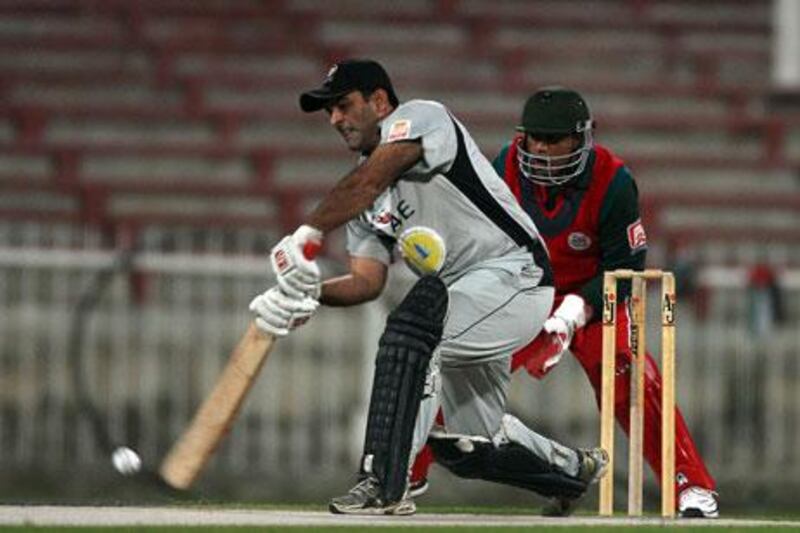The first time a side of 11 Emiratis played cricket against another nation, they lined up and sang the national anthem before starting, as though it was an international football match.
When a wicket fell or a boundary was scored, hijab and khandoura-wearing supporters threw green, red, black and white confetti and sang Arabic folk songs.
They had taken an international sport and, for the first time, given it an Emirati twist. It felt like a very exclusive private party.
And why not? Until then, few nationals had been involved in the game, and those who were had seldom felt welcome.
The tournament itself, the first Gulf Cup for Arab nationals staged in December 2009, had not been officially sanctioned.
The players were regarded as rebels and had to raise funds themselves for travel, hotels and the hire of Dubai Aluminium's private ground.
All the while, they were disregarded by the powers that be, who had eyes only for the official, expatriate-dominated national team. Had the national anthem played before their matches (it is not a regular convention in cricket) few of the players would have known the tune, let alone the words.
Thirteen months on, peace has broken out and the future looks bright. The Emirates Cricket Board has thrown its support behind the second edition of the nationals-only regional tournament, which concluded in Sharjah last night.
The governing body has reinforced its commitment to having a full complement of Emiratis in the official national team one day. This tournament is the first step towards that objective.
The next step will be integrating the developing Emirati players into senior cricket in the right way.
Tentative steps have been made in this regard in the past, not least when a policy was introduced ahead of the 2007 Asia Cup which said a quota of four Emirati players must be picked in every senior squad from then on. It barely lasted a month.
In an opinion piece in Sunday's edition of The National, Khalid al Ameri considered the difficulties of the Emiratisation of the private sector workforce.
"Give Emiratis a sense of responsibility and a reason for doing the work they are doing and they will deliver time and again," he wrote.
That is the next step needed in cricket. The players should not simply have their names written on the team sheet to satisfy a quota, then batted at No 7 or 8 and hidden in the field.
They will be making a valid contribution only when they are batting in the top four, or bowling the critical final overs. And proving they are there on merit by making runs and taking wickets.
Cricket's bosses well know the importance of having Emiratis playing the game. For one thing, it is very good PR. Sponsors are rarely more generous than those in the Emirati community.
There is also a practical reason. The UAE has been unable to send teams to junior Asian Cricket Council competitions since the governing body introduced a rule stating at least two players per team below the under 19 level must be nationals.
In some ways, the rules hinder the UAE more than other countries. Many of the leading players in this country have lived here all their lives, but are not classified as nationals as they do not have a UAE passport. Naeemuddin Aslam and Shoaib Sarwar, both UAE internationals, are two examples. Each has lived here all his life, regards the UAE as home, yet is still regarded as an expatriate.
Cricket is massive in the Gulf, thanks mainly to the large expatriate workforce from South Asia. There is no doubt the expatriate players have had an outstanding impact on the game here, least of all in their exemplary attitude to playing the game.
The sport is so ingrained in the make-up of players from the subcontinent they cannot be without it. They would sooner miss a night's sleep than a game of cricket.
Take the case of Fayyaz Ahmed, a Pakistani-born all-rounder who dovetails working as a technician specialising in fixing walkie-talkies with being one of the UAE's leading spin bowlers.
He lives in Al Ain and rarely misses a game in Sharjah, Dubai or Abu Dhabi, even though he has to take a bus to get there. If he wants to get to an early game, he either has to get up at stupid-o'clock or stay at a teammate's home. He thinks nothing of it.
Such commitment has occasionally washed off on nationals. Mohammed Tauqir, the longest-serving Emirati player, shares that hunger for playing the game, which he first learnt from Indian friends at school.
He has juggled his job in corporate banking with making more appearances for the full national team than anyone else. He clearly has an eye to the future, too, as he has been happy to play for the nascent Emirati side. He is an excellent role model for the young players.
Attempts to bring indigenous players to cricket have been flimsy in the past. These are the firmest foundations that have been laid yet, and the best chance to build a future together.






